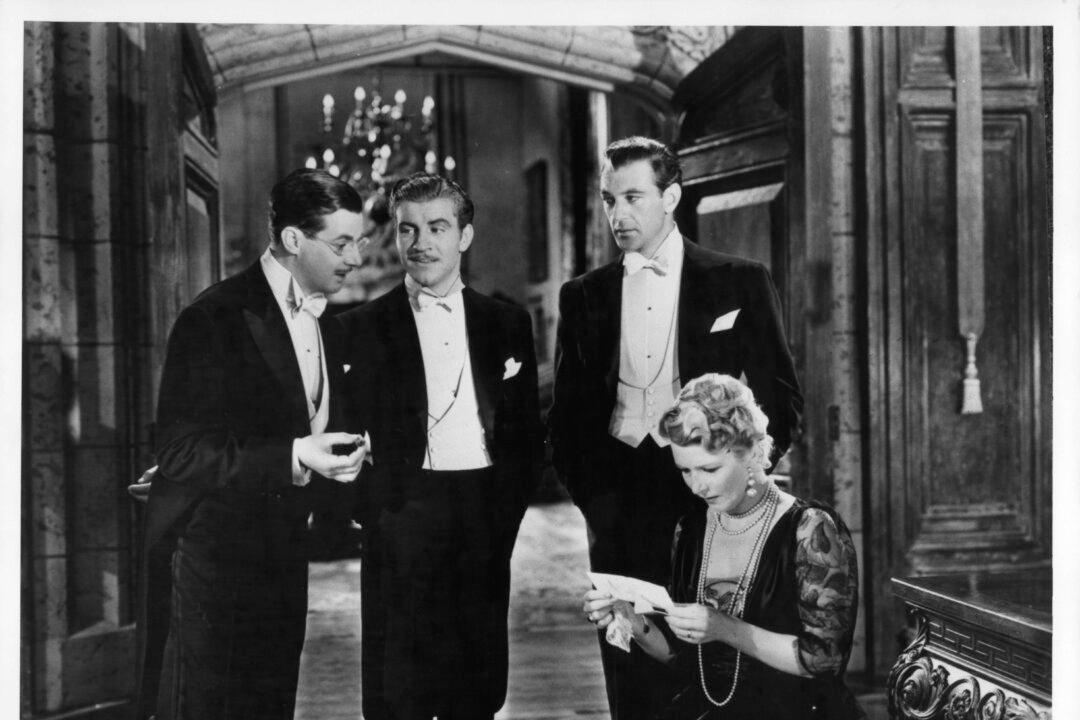NR | 1h 52min | Drama | 1939
The French Foreign Legion is an elite military corps that grew its unique global reputation by allowing foreigners from around the world to fight alongside Frenchmen. Director William A. Wellman’s film “Beau Geste” draws on Percival Christopher Wren’s adventure novel of the same name, about a band of spirited brothers who left England to join the Legion in Africa.
Lady Patricia Brandon (Heather Thatcher) brings up three orphaned brothers at Brandon Abbas, her sprawling English estate. The boys grow up together, often playing pretend warfare with toy ships, toy swords, paper helmets, and a knight’s armor. Stars in their eyes, they dream about joining the Legion as soon as they’re old enough: Michael “Beau” Geste (Gary Cooper), John Geste (Ray Milland), and Digby Geste (Robert Preston).

When the family heirloom—a precious sapphire named the “Blue Water,” worth 30,000 pounds ($37,643.46)—goes missing, Patricia presumes it’s been stolen. Suspiciously, the brothers go missing, too, only to end up with the Legion. There, the cunning and ruthless Sgt. Markoff (Brian Donlevy), believing that the sapphire is with the brothers, separates them in the hope of getting it. He orders John and Beau to join corps defending Fort Zinderneuf against rival Arabian troops, and dispatches Digby to another fort—all in the middle of the Sahara Desert.
Markoff’s men mutiny against his withering treatment, but when their commanding officer dies, Markoff’s the one left in charge. The Arab onslaught from the sliding shoulders of sand dunes stretches his men to the limit. Markoff continues to battle the Arabs and keeps his eye on Beau, who he imagines is hiding the sapphire.
It’s no small matter that Wellman released his film in July 1939; Germany invaded Poland weeks later, in August. When the world needed an all-time high in Anglo-French camaraderie, Britain and France jointly declared war on Germany and led the Allied counterattack days later in September.
Honor and Fidelity
Wren, aware of the Legion’s motto, “Honor and Fidelity” (Honneur et Fidélité), likens natural resources to a glowing sapphire. They become a nation’s wealth only if the shared values of duty, loyalty, and sacrifice unite its people.When she first shows the brothers the sapphire, Patricia says that it looks like sunlight imprisoned in a solid piece of sky. But it’s cold sunlight: “Cold as the unhappiness it has brought so many people.” That’s Wren saying that greed gets people only so far.
Watching Markoff put his men through their paces, Beau whispers to John with a mix of anguish and admiration, “A trifle uncouth, but the best soldier we’ll ever see.” That sentiment is flipped when the commanding officer, on his deathbed, tells Markoff, “Men must be led, not driven.”

A military that undervalues the humanity of its own men may win battles, but it remains in danger of losing the war. Wellman acknowledges the Legion’s expansive ethos and argues that with the right friends, a small fighting force can seem bigger, greater, and more formidable to an enemy.
As Arabs shoot down one Legionnaire after another, Markoff uses every trick he knows. As the Arabs draw nearer, he orders the handful of Legionnaires still alive to laugh loudly, feigning the merriment of a contingent. He even props up the dead along the fort’s curtain walls and turrets to bully the Arabs into fearing seemingly alert Legionnaire snipers.
Donlevy is riveting; watch closely and you’ll see how memorable screen villains followed his style. He holds his head perfectly still, walks ramrod straight, talking and smiling and snarling at the same time. He narrows his eyes to no more than slits, furrows his brows until they look like twin mountain peaks, and barks orders through nearly clenched teeth. Sure, Jack Nicholson, born four decades after Donlevy, evolved his own brand of on-screen wickedness, but don’t say you can’t see hints of Donlevy in Nicholson’s smirk or hear traces of Donlevy in his snigger.








